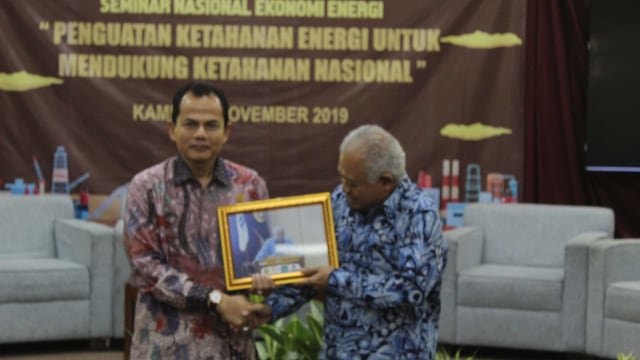Universitas Pembangunan Nasional “Veteran” Yogyakarta (UPNVY) discusses the problem of an energy security in Indonesia. This issue is an interesting topic to be discussed because it explores Indonesia's potential in terms of the energy use for the mutual prosperity.
Mohamad Irhas Effendi as the rector of UPN Veteran Yogyakarta revealed that this moment was a form of ongoing cooperation.
"We hope that this collaboration does not stop here so that we can develop how we work together to support the energy security going forward", concluded Irhas, in the National Seminar on Energy Economics entitled Strengthening Energy Security to Support National Resilience, Thursday (11/18/2019).
This development is also related because UPN Veterans Yogyakarta initiated as an energy university. "Hopefully the idea of ??an energy university based on competency at UPN and synergizing with several other components in Indonesia can contribute rapidly to the energy security in Indonesia.
This activity was also attended by the former Minister of Energy and Mineral Resources for the period 2000-2001 as well as the Minister of Defense for the 2009-2014 periods, Purnomo Yusgiantoro. He revealed that national resilience was related to the reflection of many lines of life.
"National resilience is a condition. National resilience is a reflection of all aspects of life", concluded Purnomo Yusgiantoro.
Aspects of dynamic reflection that influence it include ideology, economics, politics, social culture and defense and security. All five are related to one another in terms of the national resilience.
Speaking about the national security and its relation to energy, Purnomo highlighted the energy field which has the potential to strengthen the national security. In the discussion, the energy security is included in the national ability to respond to the dynamics of global and regional changes.
Not only that, did it also study the potential and energy infrastructure that already exists in Indonesia. Purnomo said that there are points of energy that have not been utilized.
"These (energy) points have not been maximally spread in Indonesia", he concluded, showing a map of energy locations.
Even, according to him, there are still many homework and challenges that need to be faced. There are 9 challenges, he explained. The most highlights and questions are 3 things. Among them are the need for energy is quite large and continuely increases, the dependence on fossil energy is still high, and the subsidies are not on target.
Irhas hopes that his expectations with this presentation will not only provide understanding, but also it will provide additional insight. At the same time, the most important thing is to emphasize the input and output obtained by the seminar participants. (adv)
Jl. SWK 104 (Lingkar Utara), Condongcatur, Yogyakarta 55283 (Kampus Pusat)
Jl. Babarsari 2 Yogyakarta 55281(Kampus Unit II) | Telp. +62 274 486733



